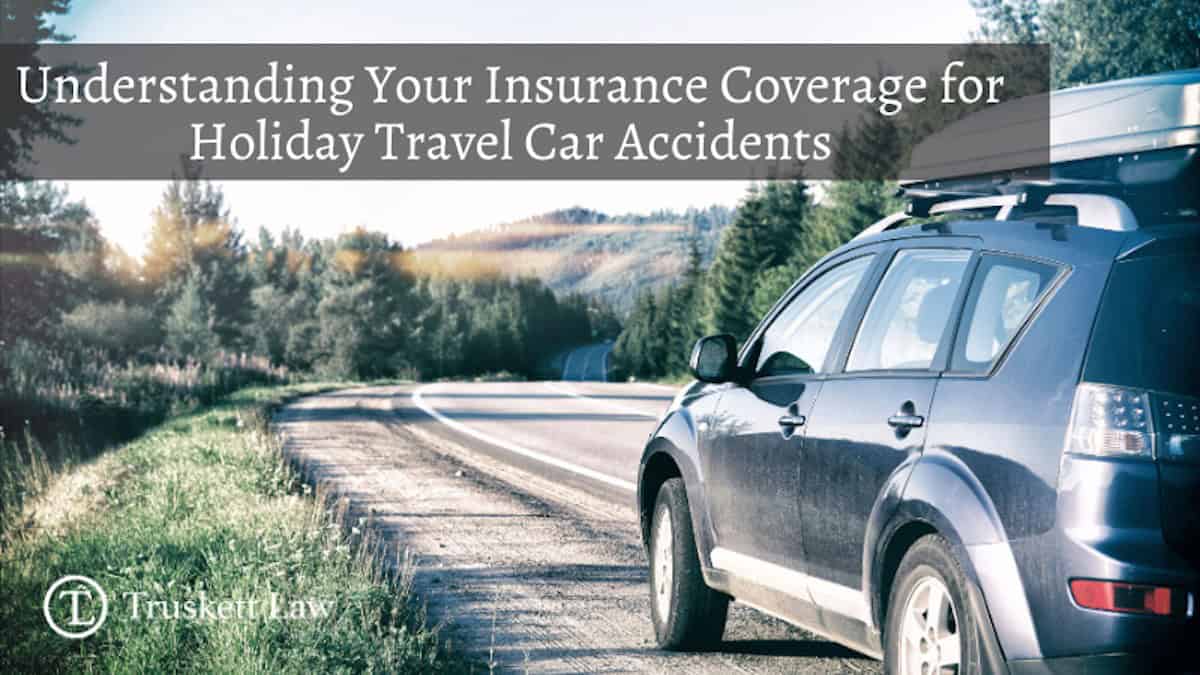
04 Dec Understanding Your Insurance Coverage for Holiday Travel Car Accidents
What You Should Know About Holiday Travel Car Accidents
The holiday season is upon us with holiday travel being one of the busiest times of the year. Millions of people hit the roads to visit family, shop for gifts, or enjoy seasonal festivities.
Unfortunately, the increase in traffic also leads to a higher risk of car accidents. In these situations, understanding your insurance coverage becomes crucial in protecting yourself financially and ensuring a smooth claims process.
This comprehensive guide will walk you through the types of insurance coverage that come into play during holiday travel car accidents, common issues you might face, and practical tips for navigating the insurance claims process.
Why Insurance Coverage Matters During Holiday Travel
Increased Traffic and Risk of Accidents
The combination of crowded highways, distracted drivers, and unpredictable winter weather significantly raises the likelihood of accidents during holiday travel. Even a minor fender bender can result in costly repairs and medical bills, making adequate insurance coverage essential.
Legal Requirements
All drivers are required to carry a minimum amount of liability insurance, but this may not cover all costs in the event of a serious accident. Understanding your policy ensures you’re prepared for potential financial impacts beyond basic coverage.

Key Types of Insurance Coverage for Holiday Travel Accidents
Liability Coverage
Liability insurance covers damages and injuries you cause to others in an accident. It typically includes:
- Bodily Injury Liability: Covers medical expenses, lost wages, and pain and suffering for the injured party.
- Property Damage Liability: Pays for damage to the other driver’s vehicle or property.
Importance During Holiday Travel: With crowded roads and frequent multi-car accidents, liability coverage is crucial to avoid out-of-pocket expenses if you’re found at fault.
Collision Coverage
Collision insurance covers the cost of repairing or replacing your own vehicle, regardless of who is at fault.
Importance During Holiday Travel: Icy roads, distracted drivers, and congested parking lots increase the chances of accidents. Collision coverage ensures your vehicle repair costs are handled promptly.
Comprehensive Coverage
Comprehensive insurance covers non-collision-related damage to your vehicle, such as theft, vandalism, or damage caused by severe weather.
Importance During Holiday Travel: From car break-ins at shopping malls to damage from snowstorms, comprehensive coverage protects you from unexpected holiday mishaps.
Uninsured/Underinsured Motorist Coverage
This coverage protects you if you’re in an accident with a driver who has no insurance or insufficient coverage.
Importance During Holiday Travel: The holidays often see an increase in uninsured drivers, and this coverage ensures you’re not left covering the costs of an accident caused by someone else’s lack of preparation.
Personal Injury Protection (PIP) or Medical Payments Coverage
PIP covers medical expenses and, in some cases, lost wages for you and your passengers, regardless of fault. Medical Payments Coverage (MedPay) offers similar protection but with fewer benefits.
Importance During Holiday Travel: With families traveling together, PIP or MedPay can help cover medical costs for everyone in your vehicle if an accident occurs.
Roadside Assistance for Holiday Travel
Roadside assistance provides services like towing, battery jump-starts, and flat tire changes.
Importance During Holiday Travel: Breakdowns or minor accidents can disrupt your holiday plans, but roadside assistance ensures you can get back on the road quickly.

Common Insurance Issues During Holiday Travel Accidents
Delayed Claims Processing
The increased number of accidents during the holidays can overwhelm insurance companies, leading to slower response times and longer claims processing periods.
How to Handle: File your claim as soon as possible and provide all necessary documentation to expedite the process.
Disputes Over Fault
Holiday traffic often leads to accidents involving multiple vehicles, which can complicate the determination of fault.
How to Handle: Collect evidence at the scene, including photos, witness statements, and police reports, to support your version of events.
Insufficient Coverage
Many drivers carry only the minimum required liability insurance, which may not cover all damages or medical expenses in a serious accident.
How to Handle: Review your policy before traveling to ensure you have sufficient coverage, especially for liability and uninsured motorist protection.
Denied Claims
Insurance companies may deny claims for reasons such as late reporting, lack of documentation, or policy exclusions.
How to Handle: Understand your policy’s terms and conditions, and consult with a lawyer if your claim is unfairly denied.
Steps to Take After a Holiday Travel Car Accident
1. Ensure Safety
2. Document the Accident
3. File a Police Report
4. Notify Your Insurance Company
5. Seek Medical Attention
6. Consult a Personal Injury Lawyer
If you’re facing challenges with your claim or believe you’re entitled to additional compensation, a lawyer can provide valuable guidance and representation.
Seeking a lawyer not only simplifies the complex claims process but also ensures that your rights are fully protected. Their expertise can help maximize your compensation and give you peace of mind during a stressful.
Tips for Preparing Your Insurance Before Holiday Travel
Review Your Policy
- Check the coverage limits for liability, collision, and comprehensive insurance.
- Ensure your policy includes uninsured/underinsured motorist coverage.
Add Temporary Coverage for Holiday Travel
- If your current policy lacks sufficient coverage for holiday risks, consider adding temporary policies for extra protection.
Keep Your Insurance Documents Handy
- Carry a copy of your insurance card and policy details in your vehicle.
Understand Your Deductibles
- Know how much you’ll need to pay out of pocket if you file a claim, and ensure you have funds available if needed.
Understanding Compensation After a Holiday Travel Accident
Medical Expenses
Vehicle Repairs
Lost Wages
Pain and Suffering
Navigating Holiday Travel Accidents Successfully
Holiday travel car accidents can bring immense stress and financial strain, but understanding your insurance coverage can help mitigate both the emotional and financial toll. Having the right policies in place, such as liability, collision coverage, roadside assistance, and uninsured motorist protection, ensures you’re prepared for the unexpected.
However, the claims process after an accident, especially during the busy holiday season, can be complex. This is where working with an experienced personal injury lawyer becomes invaluable.
A lawyer can guide you through the process, help you understand your rights, and ensure that you receive the compensation you deserve while minimizing the stress of dealing with insurance companies and legal issues.
With professional legal guidance, you can confidently navigate the claims process, secure your compensation, and focus on recovery. This support allows you to enjoy the holiday season without the added worry of handling the aftermath of an accident on your own. Safe travels!


Sorry, the comment form is closed at this time.